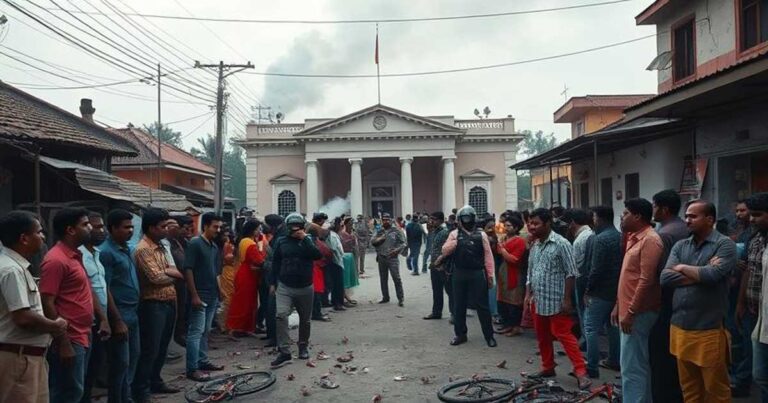A deep analysis of how the Waqf (Amendment) Act has sparked political and social unrest behind the recent violence in West Bengal. This article explores the reality of the law, public reactions, and political strategies.
West Bengal has once again found itself in the midst of uncomfortable political and social tension. At the center of the storm is the “Waqf (Amendment) Act, 2025.” What began as a protest in Murshidabad soon turned violent and spread across the state. This sequence of events is not just about a law—it reveals a complex mix of religion, politics, and social injustice.
What is the Waqf Law?
Waqf refers to property donated in the name of Allah in Muslim society, the benefits of which are used for the welfare of the Muslim community. According to Indian law, the management of Waqf properties is overseen by state and central Waqf Boards.
The proposed 2025 amendment to the Waqf Act introduces several key changes, including:
- Strengthening the control of the Waqf Board
- Making property registration rules more stringent
- Restructuring the board’s powers under government supervision
Many view these amendments as a political strategy to influence the minority community.
Murshidabad: From Protest to Violence
In the first week of April 2025, protests erupted across various parts of Murshidabad district opposing the new law. Initially peaceful, the protests turned violent between April 8 and 13. It wasn’t just a protest—it was an explosion of years of dissatisfaction, mistrust, and mismanagement.
Key incidents:
- Protesters blocked National Highway 12
- Police vehicles and government property were set on fire
- An attack was carried out on the local MP’s office
- Train operations were disrupted at Nimtita railway station
Three people were killed, and at least ten others were injured. Over 274 individuals were arrested.
Political Reactions and Controversies
The political landscape heated up after the incident. The BJP accused the state government of completely failing to maintain law and order. In contrast, the Trinamool Congress claimed the violence was premeditated and incited by external forces.
The Calcutta High Court ordered the deployment of central forces to investigate the matter. The state government also deployed additional security forces in Murshidabad and temporarily suspended internet services in some areas.
Religious Politics and Public Sentiment
The tension surrounding the Waqf law is more than just a legal issue—it’s a delicate game of religious politics. On one hand, a section of the minority community sees the law as an attack on their religious freedom and property rights. On the other hand, politicians are using the issue to serve their own interests.
The public unrest stirred by religious sentiment is not likely to die down soon. A significant question now lingers in people’s minds: Is this law truly for the benefit of the Muslim community, or is it part of a larger political agenda?
The Road Ahead
Although Murshidabad has returned to calm for now, the embers of dissatisfaction still smolder beneath the surface. What is truly needed is trust and transparency. If the government and the Waqf Board come together to build a fair and transparent structure, future bloodshed may be avoided.
Conclusion
The intersection of the Waqf law, religious politics, and public reaction has left a deep and lasting mark on the heart of West Bengal. This event has shown us that when laws are made without public participation, and when politics hides behind religion, the true beauty of democracy is bound to fade.
Through
We have not merely recounted an incident—we have shown how a single law can affect the lives and beliefs of an entire community.
Frequently Asked Questions
What is the Waqf Law?
The Waqf law is legislation that governs the management and maintenance of properties donated for religious purposes within the Muslim community. Such properties are registered as ‘Waqf’ and are typically used for mosques, madrasas, dargahs, or community welfare.
What changes were proposed in the Waqf (Amendment) Act, 2025?
The amendment seeks to increase the board’s controlling authority, make the property registration process stricter, and restructure Waqf property management under government oversight. Many believe these changes may curtail minority rights.
What happened in Murshidabad?
In April 2025, peaceful protests in Murshidabad against the Waqf law amendments turned violent. Incidents included highway blockades, arson of government property, and attacks on political offices. Three people died, and 274 were arrested.
Why was there such a strong reaction against this law?
Many Muslims believe the law undermines their religious and financial rights. Coupled with political manipulation, administrative opacity, and historical grievances, the protests quickly escalated into violence.
What steps has the government taken?
The state deployed additional police in Murshidabad and temporarily suspended internet services. The High Court ordered a central force investigation. The government claims the law is meant for development purposes.
What could the future hold?
If transparent and sincere dialogue is established between the government and the minority community, peace could be restored. Otherwise, religious politics may intensify, causing further social division.
